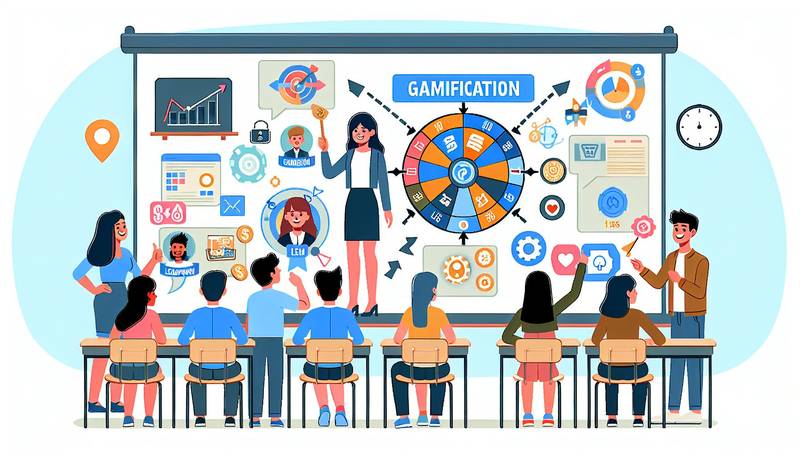Engaging Millennials and Gen Z in Marketing Education
Millennials and Gen Z are the two youngest generations in today's workforce and consumer market. With their unique characteristics and preferences, engaging these demographics in marketing education is crucial for businesses to stay relevant and successful in their marketing strategies.
- 1/10/2024
- 4 min read
 Click
to read the article
Click
to read the article
These generations grew up in the digital age, constantly surrounded by technology and social media, which has shaped their behaviors and expectations when it comes to marketing efforts. In order to effectively reach and resonate with Millennials and Gen Z, marketers need to understand their preferences and find innovative ways to engage them in marketing education.
Understanding Millennials and Gen Z
Before diving into how to engage Millennials and Gen Z in marketing education, it's important to first understand these two generations. Millennials, also referred to as Generation Y, were born between 1981 and 1996, while Gen Z, or the iGeneration, were born between 1997 and 2012. Millennials are typically characterized as tech-savvy, socially conscious, and valuing experiences over material possessions. On the other hand, Gen Z is known for being the first true digital natives, growing up with smartphones and social media from a young age. They are entrepreneurial, diverse, and prioritize authenticity in brands.
Leveraging Technology and Social Media
One of the most effective ways to engage Millennials and Gen Z in marketing education is by leveraging technology and social media platforms, which are inherently integrated into their daily lives. Marketers can create interactive and visually appealing content that is easily shareable on platforms like Instagram, TikTok, and YouTube to capture the attention of these generations. Utilizing social media influencers and user-generated content can also help establish credibility and authenticity with Millennials and Gen Z, who value peer recommendations and real-life experiences.
Personalized and Authentic Content
Millennials and Gen Z are drawn to personalized and authentic content that speaks to their individual interests and values. Marketers should focus on creating content that resonates with these generations on a personal level, using storytelling and emotional connections to make their message more relatable. By understanding the diverse preferences and values of Millennials and Gen Z, marketers can tailor their marketing education initiatives to address specific needs and interests that will resonate with these generations.
Embracing Diversity and Inclusivity
Diversity and inclusivity are fundamental values for Millennials and Gen Z, who prioritize equality and representation in brands and marketing campaigns. Marketers should aim to create inclusive content that reflects the diversity of these generations, whether it be in terms of race, gender, sexuality, or background. By showcasing a commitment to diversity and social responsibility, brands can build trust and loyalty with Millennials and Gen Z, who are more likely to support companies that align with their values.
Interactive and Experiential Learning
Traditional marketing education methods may not be as effective in engaging Millennials and Gen Z, who prefer interactive and experiential learning experiences. Marketers can create immersive workshops, webinars, and online courses that allow these generations to actively participate and engage with the material. Gamification and virtual reality tools can also be used to make learning more interactive and engaging for Millennials and Gen Z, who are accustomed to digital experiences.
Conclusion
Engaging Millennials and Gen Z in marketing education requires a deep understanding of their preferences, values, and behaviors. By leveraging technology and social media, creating personalized and authentic content, embracing diversity and inclusivity, and offering interactive and experiential learning experiences, marketers can effectively reach and resonate with these two younger generations. As they continue to shape the consumer market and workforce, engaging Millennials and Gen Z in marketing education will be essential for businesses to stay competitive and relevant in the rapidly evolving digital landscape.
Recent posts
Random news

The Growth of E-commerce and its Impact on Marketing Education
- 2023-12-25T00:00:00Z

The Relevance of Guerrilla Marketing in Educational Curricula
- 2024-01-01T00:00:00Z

Teaching Customer-Centric Marketing Strategies
- 2023-12-30T00:00:00Z

Utilizing Case Studies in Marketing Education for Real-World Learning
- 2024-01-15T00:00:00Z

Sustainability and Ethics in Modern Marketing Education
- 2024-02-27T00:00:00Z

Leveraging Big Data in Marketing Education
- 2023-12-31T00:00:00Z

Personal Branding and its Importance in Marketing Education
- 2024-02-10T00:00:00Z

Adapting to Change: Agile Methodologies in Marketing Education
- 2024-02-14T00:00:00Z

The Intersection of Psychology and Marketing in Educational Programs
- 2024-01-14T00:00:00Z

Content Marketing: Crafting a Core Component of Marketing Education
- 2023-12-18T00:00:00Z

The Importance of Cultural Competency in Global Marketing Education
- 2024-01-15T00:00:00Z

Building a Successful Career in Marketing through Education
- 2024-01-04T00:00:00Z

The Power of Visual Storytelling in Marketing Education
- 2024-02-05T00:00:00Z

Influencer Marketing: Teaching the New Age of Endorsement
- 2024-02-09T00:00:00Z

Building Collaborative Skills in Marketing Students through Team-Based Projects
- 2024-02-10T00:00:00Z

Email Marketing: An Indispensable Skill in Marketing Education
- 2024-01-27T00:00:00Z

Blending Traditional and Digital Marketing in Education Programs
- 2024-02-20T00:00:00Z

Engaging Millennials and Gen Z in Marketing Education
- 2024-01-10T00:00:00Z

Branding Basics: An Essential Course in Marketing Education
- 2024-02-27T00:00:00Z

Mobile Marketing: Education for the Smartphone Era
- 2024-01-13T00:00:00Z

The Synergy between Marketing and Sales: An Educational Perspective
- 2024-02-26T00:00:00Z


Cross-Cultural Marketing Education: Preparing for Global Challenges
- 2024-03-02T00:00:00Z

Staying Ahead: Continuous Learning in Marketing
- 2023-12-04T00:00:00Z

From Concept to Market: The Product Development Process
- 2024-02-25T00:00:00Z

Personal Selling and Sales Management in Marketing Education
- 2023-12-30T00:00:00Z

How to Design an Effective Marketing Education Curriculum
- 2024-03-01T00:00:00Z

Teaching the Future: Predictive Analytics in Marketing Education
- 2023-12-03T00:00:00Z

Developing Leadership Skills through Marketing Education
- 2024-02-13T00:00:00Z

Marketing Automation: Teaching the Tools of Efficiency
- 2023-12-18T00:00:00Z

Crisis Management and Communication in Marketing Education
- 2024-01-14T00:00:00Z

How to Effectively Use Gamification in Marketing Education
- 2024-03-01T00:00:00Z

Understanding the Marketing Mix in Today's Digital World
- 2024-01-20T00:00:00Z

Understanding Consumer Behavior: A Foundation of Marketing Education
- 2024-01-07T00:00:00Z

Emerging Trends in Marketing Education for the 21st Century
- 2024-02-06T00:00:00Z

Mastering the Fundamentals of Marketing Education
- 2023-12-17T00:00:00Z

Integrating Customer Feedback into Marketing Educational Programs
- 2023-12-21T00:00:00Z

The Future of Marketing Education: Predictions and Preparations
- 2024-03-11T00:00:00Z

Integrating Digital Tools into Marketing Education
- 2024-02-22T00:00:00Z

Strategic Marketing Planning: A Key Focus in Marketing Education
- 2024-02-23T00:00:00Z

From Classroom to Career: Marketing Education Pathways
- 2024-03-04T00:00:00Z

The Advantages of Online Marketing Education
- 2024-02-23T00:00:00Z

The Impact of AI and Automation on Marketing Education
- 2023-12-11T00:00:00Z

Utilizing Virtual Reality in Marketing Education
- 2024-01-01T00:00:00Z

Collaborative Learning in Marketing Education: Benefits and Strategies
- 2023-12-30T00:00:00Z

The Significance of Customer Relationship Management in Marketing Education
- 2024-01-29T00:00:00Z

Public Relations and Its Role in a Marketing Education
- 2023-12-11T00:00:00Z

Search Engine Optimization: A Must-Have Skill in Marketing Education
- 2024-02-15T00:00:00Z

Innovation in Retail Marketing: Trends and Education
- 2024-03-07T00:00:00Z

Personal Branding 101: Teaching the Fundamentals in a Digital Age
- 2023-12-03T00:00:00Z

The Role of Experiential Learning in Shaping Tomorrow's Marketing Leaders
- 2024-02-16T00:00:00Z

Entrepreneurial Marketing: Education for Upcoming Business Leaders
- 2024-01-06T00:00:00Z

Building and Managing Strong Brands: A Marketing Education Focus
- 2024-02-05T00:00:00Z

The Benefits of Experiential Learning in Marketing Education
- 2024-01-05T00:00:00Z

Developing Effective Marketing Communications Strategies
- 2024-01-30T00:00:00Z

Creating Compelling Content: A Pillar of Marketing Education
- 2024-02-04T00:00:00Z

Viral Marketing: Strategies and Education
- 2024-01-22T00:00:00Z

Teaching the Importance of Market Research in Decision Making
- 2024-03-07T00:00:00Z

Teaching the Art and Science of Pricing Strategies in Marketing
- 2024-01-10T00:00:00Z

Challenges and Solutions in Teaching Marketing Ethics
- 2023-12-04T00:00:00Z

The Importance of User Experience (UX) in Marketing
- 2023-12-10T00:00:00Z

Direct Marketing Techniques in the Educational Curriculum
- 2023-12-21T00:00:00Z

The Evolution of Marketing Education in the Digital Era
- 2023-12-14T00:00:00Z

The Role of Social Media in Modern Marketing Education
- 2024-03-10T00:00:00Z

Digital Advertising: A Core Subject in Marketing Education Today
- 2024-02-02T00:00:00Z

Teaching the Legal Aspects of Marketing
- 2023-12-04T00:00:00Z

Web Analytics and Digital Insights for Marketing Professionals
- 2024-01-05T00:00:00Z

The Role of Storytelling in Effective Marketing Education
- 2023-12-26T00:00:00Z

Sustainability and Ethics in Marketing: Incorporating Modern Values into Education
- 2024-02-23T00:00:00Z

Leveraging Social Media in Marketing Education: Opportunities and Challenges
- 2024-01-08T00:00:00Z

Nurturing Creativity and Innovation in Marketing Students
- 2024-02-13T00:00:00Z

Bridging the Gap between Theory and Practice in Marketing Education
- 2024-01-05T00:00:00Z

The Role of Internships in Enhancing Marketing Education
- 2023-12-25T00:00:00Z

The Importance of Analytics in Marketing Education
- 2024-02-25T00:00:00Z

The Role of Design Thinking in Marketing Education
- 2023-12-06T00:00:00Z

The Importance of Creativity in Marketing Education
- 2024-01-16T00:00:00Z

Event Marketing: Education for Memorable Brand Experiences
- 2024-01-21T00:00:00Z

Evaluating Marketing Education: Metrics for Success
- 2023-12-18T00:00:00Z

Global Marketing Strategies: Education for a Borderless World
- 2024-02-07T00:00:00Z

Navigating the World of Affiliate Marketing in Educational Programs
- 2024-01-15T00:00:00Z

The Importance of Networking in Marketing Education
- 2024-01-30T00:00:00Z

B2B Marketing: Developing Skills for the Business Market
- 2023-12-25T00:00:00Z

How Technology is Reshaping Marketing Education
- 2024-01-27T00:00:00Z

The Evolution of Marketing Education: Preparing Students for a Data-Driven World
- 2023-12-21T00:00:00Z

Effective Use of Social Listening Tools in Marketing
- 2024-02-18T00:00:00Z

From Classroom to Boardroom: Real-World Applications of Marketing Theories
- 2024-02-04T00:00:00Z

Exploring the Intersection of Psychology and Marketing in Educational Programs
- 2024-02-16T00:00:00Z

Marketing for Social Impact: Education for Change
- 2023-12-10T00:00:00Z

Lifestyle Marketing: Connecting Brands with Consumers' Lives
- 2024-01-05T00:00:00Z

Developing a Global Mindset through Marketing Education
- 2024-02-23T00:00:00Z

Enhancing Digital Literacy in Marketing Education
- 2024-02-07T00:00:00Z

Adapting Marketing Strategies for the Non-Profit Sector
- 2024-03-04T00:00:00Z

Marketing to Millennials: Challenges and Strategies
- 2024-02-20T00:00:00Z

The Role of Data Privacy in Marketing Education
- 2023-12-19T00:00:00Z

The Art of Convincing: Persuasion Techniques in Marketing
- 2024-02-06T00:00:00Z

Preparing Marketers for the Challenges of Globalization
- 2024-01-25T00:00:00Z

Bridging the Gap: Integrating Digital Tools into Traditional Marketing Curriculum
- 2024-02-04T00:00:00Z

Crowdfunding as a Marketing Tool: An Educational Perspective
- 2023-12-11T00:00:00Z

Navigating the Future of Marketing Education: Trends and Innovations
- 2023-12-08T00:00:00Z

Cultivating Strategic Thinking in Marketers through Education
- 2023-12-06T00:00:00Z
 Marketing Minds: Unleashing Your Potential in the Modern Age
Marketing Minds: Unleashing Your Potential in the Modern Age